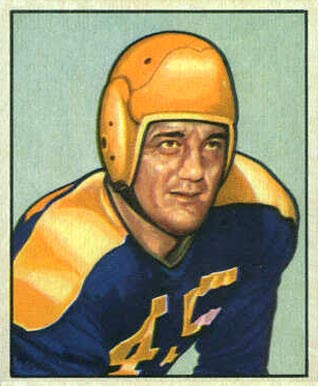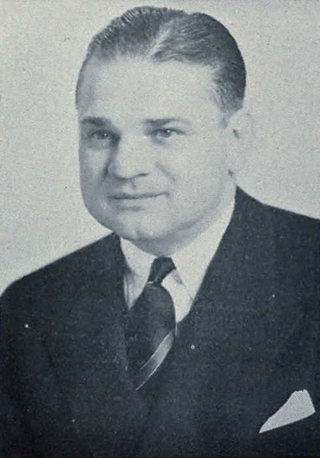Related Research Articles

Bernard W. Bierman was an American college football coach best known for his years as head coach of the Minnesota Golden Gophers football program. Between 1934 and 1941, his Minnesota teams won five national championships and seven Big Ten championships and had four perfect seasons. Bierman's five national championships rank him among the greatest college football coaches of all time, as only 2 coaches have won more.

The Minnesota Golden Gophers football team represents the University of Minnesota in college football at the NCAA Division I Football Bowl Subdivision level. Founded in 1882, Minnesota has been a member of the Big Ten Conference since its inception in 1896 as the Western Conference. The Golden Gophers claim seven national championships, including four from the major wire-service: AP Poll and/or Coaches' Poll.

Edwin Clarence Widseth was an American professional football player who was a tackle for the New York Giants of the National Football League (NFL) for four seasons. He played college football for the Minnesota Golden Gophers football team of the University of Minnesota, where he was a consensus All-American in 1935 and 1936. Widseth was drafted by the New York Giants in the first round of the 1937 NFL draft, and was chosen for the Pro Bowl in 1938. He was later inducted into the College Football Hall of Fame.

The Iowa–Minnesota football rivalry is an American college football rivalry between the Iowa Hawkeyes football team of the University of Iowa and Minnesota Golden Gophers football team of the University of Minnesota. Floyd of Rosedale, introduced in 1935, is a bronze trophy in the shape of a pig which is awarded to the winner of the game.

Richard Kay Wildung was an American football tackle who played college football for Minnesota (1940–1942) and professional football in the National Football League (NFL) for the Green Bay Packers. He played for back-to-back national championship teams at Minnesota and was a consensus All-American in 1941 and 1942. He was inducted into the College Football Hall of Fame in 1957.
The 1932 Minnesota Golden Gophers football team represented the University of Minnesota in the 1932 Big Ten Conference football season. In their first year under head coach Bernie Bierman, the Golden Gophers compiled a 5–3 record, shut out three opponents, and outscored all opponents by a combined score of 86 to 42.
The 1933 Minnesota Golden Gophers football team represented the University of Minnesota in the 1933 Big Ten Conference football season. In their second year under head coach Bernie Bierman, the Golden Gophers compiled a 4–0–4 record and outscored their opponents by a combined total of 64 to 32.
The 1934 Minnesota Golden Gophers football team represented the University of Minnesota in the 1934 college football season. In their third year under head coach Bernie Bierman, the Golden Gophers compiled an undefeated 8–0 record, shut out four opponents, and outscored all opponents by a combined total of 270 to 38.
The 1935 Minnesota Golden Gophers football team represented the University of Minnesota in the 1935 college football season. In their fourth year under head coach Bernie Bierman, the Golden Gophers compiled an undefeated 8–0 record and outscored their opponents by a combined total of 194 to 36.
The 1936 Minnesota Golden Gophers football team represented the University of Minnesota in the 1936 college football season. In their fifth year under head coach Bernie Bierman, the Golden Gophers compiled a 7–1 record and outscored their opponents by a combined total of 203 to 32. The team was named national champion by eight NCAA-designated major selectors in Associated Press, Billingsley Report, Dickinson System, Dunkel System, Helms Athletic Foundation, Litkenhous, National Championship Foundation, and Poling System. This marked the third consecutive year the team was selected as national champion. However, the Big Ten Conference did not allow its members to play postseason bowl games at the time, a conference bylaw that would not be changed until 1946.
The 1940 Minnesota Golden Gophers football team represented the University of Minnesota in the 1940 Big Ten Conference football season. In their ninth year under head coach Bernie Bierman, the Golden Gophers compiled an undefeated 8–0 record and outscored their opponents by a combined total of 154 to 71.
The 1941 Minnesota Golden Gophers football team represented the University of Minnesota in the 1941 Big Ten Conference football season. In their tenth year under head coach Bernie Bierman, the Golden Gophers compiled an undefeated 8–0 record and outscored their opponents by a combined total of 186 to 38. The team's national championship run in the days before the attack on Pearl Harbor was chronicled in journalist Danny Spewak's book, "From the Gridiron to the Battlefield: Minnesota's March to a College Football Title and into World War II," published in 2021 by Rowman & Littlefield.
The 1949 Minnesota Golden Gophers football team represented the University of Minnesota in the 1949 Big Nine Conference football season. In their 15th year under head coach Bernie Bierman, the Golden Gophers compiled a 7–2 record and outscored their opponents by a combined total of 231 to 80.
The 1935 College Football All-America team is composed of college football players who were selected as All-Americans by various organizations and writers that chose College Football All-America Teams in 1935. The nine selectors recognized by the NCAA as "official" for the 1935 season are (1) Collier's Weekly, as selected by Grantland Rice, (2) the Associated Press (AP), (3) the United Press (UP), (4) the All-America Board (AAB), (5) the International News Service (INS), (6) Liberty magazine, (7) the Newspaper Enterprise Association (NEA), (8) the North American Newspaper Alliance (NANA), and (9) the Sporting News (SN).
Sheldon Beise was an American football player and coach.
Louis Thomas Midler was an American football guard and tackle who played two seasons in the National Football League (NFL) for the Pittsburgh Pirates and Green Bay Packers. He played college football for the Minnesota Golden Gophers and was selected by the Pirates in the fifth round of the 1938 NFL draft.

The history of Michigan Wolverines football in the Kipke years covers the history of the University of Michigan Wolverines football program during the period from the hiring of Harry Kipke as head coach in 1929 through his firing after the 1937 season. Michigan was a member of the Big Ten Conference during the Kipke years and played its home games at Michigan Stadium.
The 1935 All-Big Ten Conference football team consists of American football players selected to the All-Big Ten Conference teams chosen by various selectors for the 1935 Big Ten Conference football season.
The 1936 Big Ten Conference football season was the 41st season of college football played by the member schools of the Big Ten Conference and was a part of the 1936 college football season.
The 1935 Big Ten Conference football season was the 40th season of college football played by the member schools of the Big Ten Conference and was a part of the 1935 college football season.
References
- ↑ "1936 Chicago Bears". databaseFootball.com. Archived from the original on April 10, 2007. Retrieved July 5, 2020.
- ↑ "BIERMAN WONDERS WHO UNKNOWN PLAYER TO STAR WILL BE THIS YEAR". Brainerd Daily Dispatch. September 13, 1934.
- ↑ "Six Mid-West Gridders Placed on UP All-America Eleven". Kokomo Tribune. November 29, 1935.
- ↑ "EAST STARR TO COAST". Emporia Gazette (AP wire story). December 18, 1935.
- ↑ "All-Star Team To Meet Lions Named by Fans". Hamilton Daily News Journal. July 20, 1936.
- ↑ "College All-Stars To Battle Detroit At Chicago Tonight". San Antonio Express. September 1, 1936.
- ↑ Bernard Bierman (November 20, 1935). Mid-West Places Three Upon NEA's All-America for 1935.
{{cite news}}: Missing or empty|title=(help) - ↑ Alan Gould (December 7, 1935). "Midwest and South Provide Most All-American Talent". Kokomo Tribune.
- ↑ "1936 NFL Draft Listing". Pro-Football-Reference.com. Retrieved March 20, 2023.
- ↑ "NIC-10 Sports History Book: Breakout Athletes: Dick Smith, Rockford". December 25, 2020.